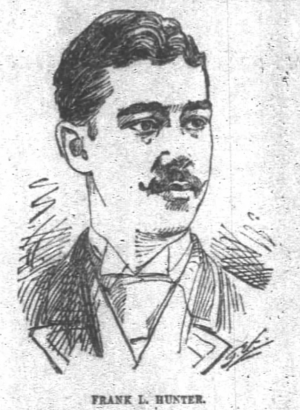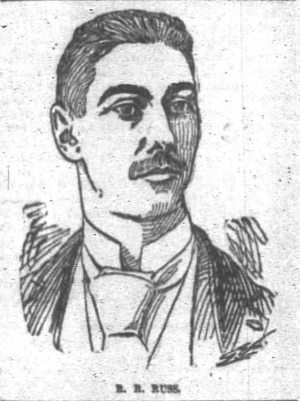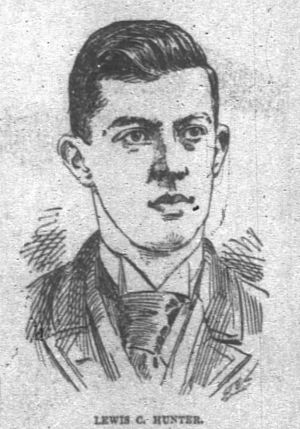OLYMPIC CYCLISTS. Young Men Who Will Boom Wheeling. Some Reminiscences of the Sport. - Sat, Oct 14, 1893 - Page 10 - San Francisco Chronicle
OLYMPIC CYCLISTS.
Young Men Who Will Boom Wheeling.
Some Reminiscences of the Sport.
Benefit of Cycling Clubs Joining a Big Athletic Organization.
The early wheelmen were by force of circumstances a gregarious lot. To sally forth upon the public highway with that decidedly alarming type of vehicle, the old ordinary bicycle, called for a degree of courage, both moral and physical, which was most readily obtained from the association of numbers.
One of the original members of the old San Francisco Bicycle Club, organized in 1878, telling of a run over the Point Lobos road soon after the organization of the club, relates that each man came to the place of rendezvous, the junction of Central and Point Lobos avenues with his wheel in an express wagon, and when the run was over, loaded his wheel into his own particular wagon and was driven home.
"We would not have dared in those days," says this wheelman, "to have ridden or trundled our wheels through the streets. We would have attracted a mob which would have called for police interference."
The club at once became a feature of cycling. Wherever two or three wheelmen were gathered together an organization followed, often it happened that the offices to be filled were in excess of the members, and one man would hold two official positions. The meeting place was generally around a lamppost on some corner. As shops devoted exclusively to bicycle supplies were opened they naturally became the meeting places of clubs. In time the larger clubs began to project independent headquarters, more or less pretentious, and then there was trouble.
The energy which might have been devoted to the promotion of sport was absorbed in the discouraging task of endeavoring to make receipts meet expenses. A Chicago cycling paper in recent issue speaks of the average bicycle club as chronically in arrears to its janitor. The tendency in the Eastern States toward the amalgamation of bicycle clubs with the great athletic organizations has long been noticeable, and the advantages of a bicycle club becoming a feature of an athletic club have become apparent in this locality.
In the early days of cycling the Oakland Bicycle Club was a large and enthusiastic organization, but [the revolution in favor of the bicycle made of it a vehicle of recognized utility, and the mere fact of riding such a vehicle was no longer a sufficient bond of unity to hold men in association, the club declined], and repeated efforts failed to maintain a purely bicycle club in Oakland despite the level and well-paved streets of that city and its environment of well-kept roads. But the cycling sections of the Acme and Reliance Athletic clubs of Oakland are now active and enthusiastic bodies and have been potent factors in the growth and development of their respective clubs.
The bicycle clubs of to-day may be said to bear the same relation to wheelmen as do jockey, polo, driving and coaching clubs to horsemen. Comparatively few clubs are needed in either field, and in the field of cycling it seems likely that the best results are to be obtained from cooperation with those athletic clubs that foster all forms of reputable sport.
It has attracted comment that the Olympic Club of this city, the oldest amateur athletic organization on the Pacific coast and assuming to be foremost in the encouragement of every form of sport, should have so long neglected cycling. It was not until the summer of the present year that any positive effort was made toward fostering this sport. A mere handful of enthusiasts within the club then induced it to open its doors to the old San Francisco Bicycle Club. Encouraged by the re-inforcements thus obtained the friends of cycling started in with great vigor to make their favorite sport a feature of the Olympic Club. It was first decided that the cycling section should be known as the Olympic Club Wheelmen. A distinctive but neat and serviceable uniform was adopted, consisting of cap, coat and knickerbockers of dark blue cloth, with white sweater, the cap and sweater bearing the emblem of the Olympic Club, the winged O in red. Joining the California Associated Cycling Clubs the wheelmen participated in the annual parade of the clubs at San Jose on September 9th last, and were awarded the prize for the most attractive appearance in line.
That there is much to be accomplished before the wheelmen of the club can hope to take a place in cycling equal to that occupied by the Olympic Club in other fields of sport is fully realized. Any man can ride a bicycle, but to carry the colors of his club to the front on the road or path calls for a high degree of physical excellence. The Olympic Club offers every facility for attaining this excellence, and that with proper encouragement racing men will be developed may be reasonably expected.
Foremost among those who are identified with cycling within the club is Robert R. Russ, the present captain of the wheelmen. He was born in this city about twenty-six years ago, and is the son of the well-known pioneer and capitalist, A. G. Russ. He has a lively appreciation of all kinds of sport, is an all-round athlete, and takes an active part in the exercises of the Olympic Club, ot which he is a life member.
Frank L. Hunter, the first lieutenant of the wheelmen, is satisfied to devote his energies almost exclusively to cycling, considering it the greatest of all sport. W. H. Haley, the second lieutenant, is perhaps the speediest rider in the club, and bids fair to develop into a great racing man. Lewis C. Hunter, the secretary of the wheelmen, is also secretary-treasurer of the California Associated Cycling Clubs, to which position he was elected at the meeting of the board of governors of the associated clubs held in this city on the 7th inst. Martin Espinosa, Edward Stack, J. A. R. Johnson, J. H. Ballin, O. A. Weihe, J. H. Dieckman Jr., F. L. Fuller, O. B. Burns, L. B. Thomas, H. C. Massie, L. H. Cox, W. R. Lovegrove, L. D. Owens, J. L. Fagothey, G. H. Stratton, S. G. Scovern, H. C. Hahn, H. S. Russ, N. A. Robinson, J. M. Rogers, Henry Rogers, Harry Gibbs, J. W. Mullen, W. P. Fuller, T. C. Mastelller, Frank Twichell, Cress Unger and H. H. White are some of the prominent and active members of the wheelmen. Director J. R. McElroy is the presiding officer of the wheelmen, and represents them in the board of directors of the Olympic Club.
On the 29th of this month the Olympic Club wheelmen will contest a ten-mile handicap road race on the San Leandro triangular course. This, it is expected, will determine the qualities of the various embryo racing men of the club.
SANGER TO QUIT TRAINING.
The Cyclist Tired of Racing and will Take a Rest.
Sanger and C. R. Culver, his trainer, were in the city yesterday in readiness for the races, and appeared disgusted because they were abandoned. "Just my luck," said Sanger. "However, I can put in a day at the fair," and in company with some local wheelmen he wandered off, says the Chicago Inter-Ocean.
Culver expressed himself freely, and his disappointment was evident. His man was in pretty fair condition, and he anticipated that he would make amends for his late in-and-out riding.
"We counted on this as our last appearance this season," said Mr. Culver. "Sanger is tired and has had enough this year. He is not partial to hard training, and wants to put an end to it as soon as possible, so he will make no attempts at the records, but will go out of training at once.”
When questioned in regard to Sanger's poor showing after the Springfield meet, especially at Baltimore, Philadelphia and Reading, Mr. Culver spoke freely.
"Sanger was a greatly disappointed man at the international meet here in August, when he got his fall, and all my entreaties could not get him to work as he had done before. If ever a man was fit Sanger was for that meet; he knew it and felt confident of carrying off the championship. He knew that to beat Zimmerman at that meet meant everything, and no matter how often he beaten [sic] afterward any excuse would was be accepted. But his fall unnerved him, and when he found himself unable to ride he grew despondent. Even the idea of meeting Zimmerman at Springfield did not appear to give him any heart for his work, and I can assure you his training since then has been no child's play for me. Sanger is a big man, and it takes a lot of good hard work to keep him in condition, to say nothing of the work getting him there. He has been lazy and shirked his work, never really entering into it with any spirit since his fall, and although he began to show in [sic] something like his old-time form in the handicap heats at Springfield the first day, he was really nowhere near as fit as he was at Detroit when he fairly outrode Zimmerman. After the Spring field meet it was harder to get him to work than ever, he didn't seem to care a continental peanut whether he made a good showing or not, and I almost gave him up as a bad job. At Philadelphia and Baltimore the track was against him, but in reality he was no match for Tyler or Windle, who were in the pink of condition, preparatory to their record trials.
"How would I class Sanger? Well, now, on the showing he has made, unfortunately he cannot be called the champion of the world, but I will risk my right arm that Sanger, fit as I have had him, can be beaten by no man living. We have been unfortunate, had Sanger ridden at the meet here I think the result would have been different altogether. However, we must be satisfied with the fact that he has ridden a mile and two miles faster, in actual races, than anyone else."


